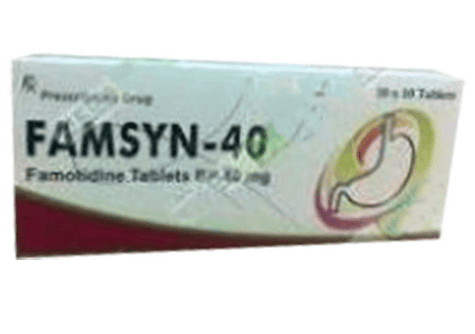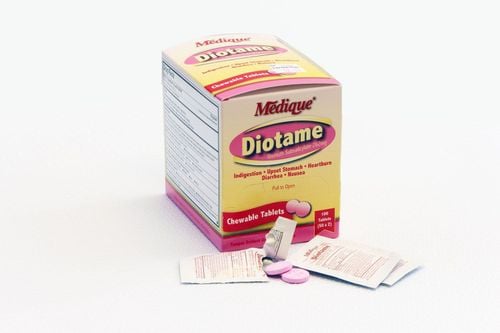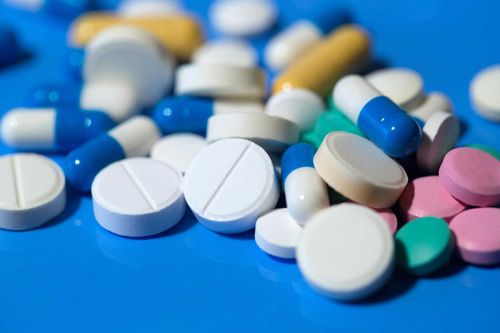This is an automatically translated article.
Rabeprazole 10mg is used in the treatment of stomach and esophageal symptoms such as acid reflux and stomach ulcers. Rabeprazole sodium as active ingredient. So how is Rabeprazole 10 used?1. What is Rabeprazole 10mg?
Rabeprazole 10 belongs to the group of gastrointestinal proton pump inhibitors. The drug has the main ingredient Rabeprazol sodium 10mg and other excipients.Rabeprazol 10 is prepared in the following forms:
Enteric-soluble tablets: in packs of 10 mg, 20 mg and 40 mg. Granules mixed with enteric coated suspension: 40mg/pack. Drugs for injection (intravenous infusion): 20mg/tube, 40mg/tube. Injection (intravenous infusion): 20 mg lyophilized powder/vial. Products are researched and manufactured at Cuu Long Pharmaceutical Joint Stock Company (PHARIMEXCO) - VIETNAM.
2. Indications for taking Rabeprazole 10mg
Rabeprazole is used to treat certain problems in the stomach and esophagus, such as acid reflux and stomach ulcers. It works by reducing the amount of acid in the stomach, helping to relieve symptoms such as heartburn, persistent cough and difficulty swallowing. Rabeprazol 10mg medicine helps to heal acid damage in the stomach and esophagus, helps prevent ulcers and prevents cancer of the esophagus and is used in specific cases as follows:
Acute duodenal ulcer: treatment for 4 weeks. Acute gastric ulcer. Gastroesophageal reflux disease (GERD) without or with esophagitis, ulceration or abrasion: Treatment duration from 4 to 8 weeks and maintenance for no more than 12 months to prevent recurrence. Intravenous infusion in case of high gastrointestinal bleeding not due to esophageal varices. Zollinger-Ellison syndrome. In combination with an appropriate course of antibiotics to eradicate Helicobacter pylori in patients with duodenal ulcer. Some other effects of Rabeprazole are not listed on the approved drug label, but your doctor may prescribe it for you. Patients only use this drug Rabeprazole to treat certain diseases when prescribed by a doctor or pharmacist.
3. Dosage and how to use Rabeprazole
The following information is not a substitute for medication leaflets or medical professional advice. Patients should always consult their doctor or pharmacist before deciding to take Rabeprazole 100mg for treatment.
3.1. How to use Rabeprazole 10mg is indicated for treatment once a day, the patient should take the drug in the morning and before eating. Patients need to swallow the tablet whole, do not chew or crush the tablet or administer intravenously.
3.2. Dosage of Rabeprazole Adults:
Acute duodenal ulcer: Take 20mg of Rabeprazole sodium / day, 1 time in the morning. If the ulcer is not completely healed, it should be maintained for 4 weeks. Benign acute gastric ulcer: Take 20mg Rabeprazole sodium/day, once in the morning, for 6 weeks. If the ulcer is not completely healed, it should be continued for 6 weeks. Gastro-oesophageal reflux syndrome with ulcer or scratch symptoms: Take 20mg of Rabeprazole sodium, once a day, for 4-8 weeks. Treatment of gastroesophageal reflux disease: Usually, long-term medication and maintenance therapy are required. A daily dose of 10 - 20 mg of Rabeprazole sodium, orally once a day, is recommended, depending on the response of the disease. core. Symptomatic treatment of gastroesophageal reflux disease without esophagitis: The recommended dose is 10mg of rabeprazole sodium once daily for up to 4 weeks, then 10mg of rabeprazole sodium once daily as needed. If symptoms are not controlled within 4 weeks, the patient should be re-examined. Zollinger - Ellison syndrome: Adults, the starting dose is 60mg Rabeprazol sodium / time / day. The dose may be increased to a maximum of 120 mg of rabeprazole/day in 2 divided doses as needed for the individual patient. A once-daily dose of up to 100 mg of rabeprazole may be prescribed. The course of using Rabeprazole lasts until the clinical symptoms are gone. Treatment of benign gastric ulcer and duodenal ulcer associated with H. pylori infection: The recommended dose should be combined with the following drugs within 7 days: Rabeprazole 20 mg/times, 2 times/day + clarithromycin 500mg/times , 2 times / day and amoxicillin 1g / time, 2 times / day. It is best to use it in the morning and evening. Children:
Treatment of symptomatic GERD in adolescents 12 years of age and older: Rabeprazole sodium delayed-release tablets are indicated for the treatment of symptomatic GERD in adolescents older than 12 years of age at a dose of 20 mg. Rabeprazole sodium, taken once daily for up to 8 weeks. Patients with hepatic and renal impairment:
No dose adjustment of Rabeprazole sodium is required.
4. Contraindications to using Rabeprazole 100mg
Rabeprazol 100mg drug should not be used in the following cases:
Patients with hypersensitivity to Rabeprazol sodium or any ingredient in the drug. Hypersensitivity to Benzimidazole derivatives such as Ezomeprazole, Pantoprazole, Lanzoprazole, Omeprazole. Pregnant women. Breastfeeding.
5. Drug interactions Rabeprazole 100mg
Combined use of Rabeprazole 100mg drug with some other drugs may occur drug interactions as follows:
Rabeprazole can increase blood levels of digoxin and prolong metabolism and excretion of Phenytoin. Rabeprazole in combination with Itraconazole or Ketoconazole: May reduce the absorption of Itraconazole or Ketoconazole. Therefore, if the patient needs to be monitored, adjust the dose of Itraconazole or Ketoconazole. Avoid concomitant use of Rabeprazole with the drugs Nelfinavir, Erlotinib, Delavirdin, Posaconazole. Co-administration of Atazanavir 300 mg/ritonavir 100 mg with a single dose of rabeprazole 40 mg/day or Atazanavir 400 mg with a single dose of lanzoprazole 60 mg/day in healthy volunteers showed a significant reduction in Atazanavir concentrations. Atazanavir absorption is highly pH dependent. Despite research data, it is expected that the same phenomenon may also occur with other proton pump inhibitors. Therefore, Rabeprazole should not be co-administered with proton pump inhibitors. Rabeprazole may decrease the concentration or effect of Clorpidogrel, Atanazavir, Dabigatran, Dasatinib, Etexilat, Erlotinib, Indinavir, iron salts, Itraconazole, Nelfinavir, Ketoconazole, Mesalamin, Mycophenolate. Rabeprazole may increase the concentration/effect of drugs that are substrates CYP2C8 (high risk), CYP2C19, Methotrexate, Voriconazole., Saquinavir. To ensure safety when taking Rabeprazole 100mg, patients should inform their doctor of all drugs they are using to avoid unwanted drug interactions.
6. Side effects when taking Rabeprazole 100mg
During the use of Rabeprazol 100mg, patients may experience some unwanted side effects such as:
Common Headache, diarrhea, flatulence, abdominal pain, abdominal pain, nausea, constipation , weakness, rash and dry mouth. These symptoms are usually mild to moderate, sometimes only transient.
In addition, there are some other common effects that may occur such as infection, headache, dizziness, insomnia, cough, sore throat, rhinitis, unexplained pain, back pain, similar symptoms flu.
Uncommon Restlessness, chest pain, drowsiness, dyspepsia, belching, pruritus, erythema, myalgia, cramps, arthralgia, urinary tract infection, chills, fever, increased liver enzymes.
Rare: neutropenia, thrombocytopenia, leukopenia, leukocytosis, hypertension, depression, anorexia, visual disturbances, hepatitis, jaundice, gastritis, dental inflammation , taste disturbance, hepatic encephalopathy, pruritus, sweating, interstitial nephritis, bullous reaction, weight gain.
Very rare Toxic epidermal necrolysis, erythema multiforme and Stevens - Johnson syndrome.
The incidence of peripheral edema, hyponatremia, gynecomastia in men is unknown.
7. Precautions when using Rabeprazole 100mg
Before taking Rabeprazol 100mg for treatment, patients should carefully consult the information on the drug leaflet or the prescription of a doctor or pharmacist. In addition, you can refer to some additional information below.
Patients before taking Rabeprazole need to exclude the possibility of malignancy. In the case of Rabeprazole treatment for more than one year, periodic monitoring is required. Rabeprazole should be used with caution with other proton pump inhibitors or benzimidazole derivatives as substitutes, because of the risk of cross-hypersensitivity reactions to these drugs. Rabeprazole should not be used in children because of the lack of experience and data on its safety. There have been post-marketing reports of hematopoietic disorders such as neutropenia and thrombocytopenia. In most cases, no etiology is found, but these blood disorders are not serious and usually disappear when rabeprazole is stopped. Liver enzyme abnormalities have been reported in clinical trials and following the use of rabeprazole. But if there is no other cause, these enzyme disorders are usually not serious and will go away when Rabeprazole is stopped. However, Rabeprazole 100mg should be used with caution in patients with severe hepatic impairment. Treatment with proton pump inhibitors, including rabeprazole, may increase the risk of gastrointestinal infections with Clostridium difficile, Salmonella and Campylobacter. The combination of Atazanavir with Rabeprazole sodium is not indicated. Rabeprazole should not be used in patients with hereditary galactose intolerance, glucose or galactose malabsorption or Lapp lactase deficiency. Rabeprazole 100 is contraindicated in pregnant women and nursing mothers. Because, there are no data on the safety of Rabeprazole when used in pregnant women and it is not known whether the drug is excreted in human milk (there are data that rabeprazole is excreted in the milk of rats). Rabeprazole can cause side effects such as drowsiness, dizziness and headache, so it should be used with caution when driving or operating machinery. Rabeprazole 10mg tablet contains the active ingredient Rabeprazole sodium. It is used to treat symptoms of the stomach and esophagus, such as acid reflux and stomach ulcers. To ensure the effectiveness of treatment and avoid unwanted side effects, patients need to strictly follow the instructions of the doctor, professional pharmacist.
Follow Vinmec International General Hospital website to get more health, nutrition and beauty information to protect the health of yourself and your loved ones in your family.
Please dial HOTLINE for more information or register for an appointment HERE. Download MyVinmec app to make appointments faster and to manage your bookings easily.













